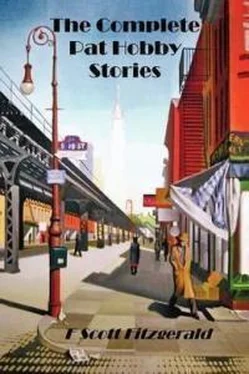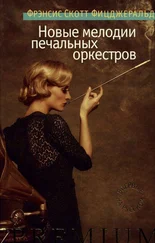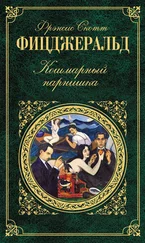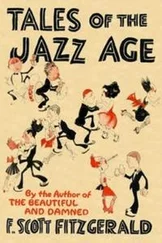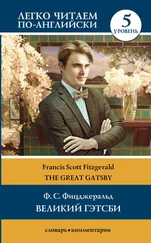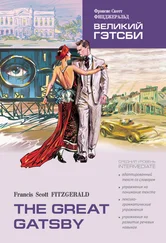There was again silence for a moment.
'That isn't a bad idea,' said Bach thoughtfully. He turned to the others. 'You know? In itself?'
Bill Costello nodded
'Not bad at all. And I know where we could spot it. Right at the end of the fourth sequence. We just change old Ames to a painter.'
Presently they talked money.
'I'll give you two weeks on it,' said Berners to Pat. 'At two– fifty.'
'Two–fifty!' objected Pat. 'Say there was one time you paid me ten times that!'
'That was ten years ago,' Jack reminded him. 'Sorry. Best we can do now.'
'You make me feel like that old painter—'
'Don't oversell it,' said Jack, rising and smiling. 'You're on the payroll.'
Pat went out with a quick step and confidence in his eyes. Half a grand—that would take the pressure off for a month and you could often stretch two weeks into three—sometimes four. He left the studio proudly through the front entrance, stopping at the liquor store for a half–pint to take back to his room.
By seven o'clock things were even better. Santa Anita tomorrow, if he could get an advance. And tonight—something festive ought to be done tonight. With a sudden rush of pleasure he went down to the phone in the lower hall, called the studio and asked for Miss Pricilla Smith's number. He hadn't met anyone so pretty for years …
In her apartment Pricilla Smith spoke rather firmly into the phone.
'I'm awfully sorry,' she said, 'but I couldn't possibly … No— and I'm tied up all the rest of the week.'
As she hung up, Jack Berners spoke from the couch.
'Who was it?'
'Oh, some man who came in the office,' she laughed, 'and told me never to read the story I was working on.'
'Shall I believe you?'
'You certainly shall. I'll even think of his name in a minute. But first I want to tell you about an idea I had this morning. I was looking at a photo in a magazine where they were packing up some works of art in the Tate Gallery in London. And I thought—'
"Boil Some Water—lots of It"
Esquire (March 1940)
Pat Hobby sat in his office in the writers' building and looked at his morning's work, just come back from the script department. He was on a "polish job," about the only kind he ever got nowadays. He was to repair a messy sequence in a hurry, but the word "hurry" neither frightened nor inspired him for Pat had been in Hollywood since he was thirty—now he was forty–nine. All the work he had done this morning (except a little changing around of lines so he could claim them as his own)—all he had actually invented was a single imperative sentence, spoken by a doctor.
"Boil some water—lots of it."
It was a good line. It had sprung into his mind full grown as soon as he had read the script. In the old silent days Pat would have used it as a spoken title and ended his dialogue worries for a space, but he needed some spoken words for other people in the scene. Nothing came.
"Boil some water," he repeated to himself. "Lots of it."
The word boil brought a quick glad thought of the commissary. A reverent thought too—for an old–timer like Pat, what people you sat with at lunch was more important in getting along than what you dictated in your office. This was no art, as he often said—this was an industry.
"This is no art," he remarked to Max Learn who was leisurely drinking at a corridor water cooler. "This is an industry."
Max had flung him this timely bone of three weeks at three–fifty.
"Say look, Pat! Have you got anything down on paper yet?"
"Say I've got some stuff already that'll make 'em—" He named a familiar biological function with the somewhat startling assurance that it would take place in the theater.
Max tried to gauge his sincerity.
"Want to read it to me now?" he asked.
"Not yet. But it's got the old guts if you know what I mean."
Max was full of doubts.
"Well, go to it. And if you run into any medical snags check with the doctor over at the First Aid Station. It's got to be right."
The spirit of Pasteur shone firmly in Pat's eyes.
"It will be."
He felt good walking across the lot with Max—so good that he decided to glue himself to the producer and sit down with him at the Big Table. But Max foiled his intention by cooing "See you later" and slipping into the barber shop.
Once Pat had been a familiar figure at the Big Table; often in his golden prime he had dined in the private canteens of executives. Being of the older Hollywood he understood their jokes, their vanities, their social system with its swift fluctuations. But there were too many new faces at the Big Table now—faces that looked at him with the universal Hollywood suspicion. And at the little tables where the young writers sat they seemed to take work so seriously. As for just sitting down anywhere, even with secretaries or extras—Pat would rather catch a sandwich at the corner.
Detouring to the Red Cross Station he asked for the doctor. A girl, a nurse, answered from a wall mirror where she was hastily drawing her lips, "He's out. What is it?"
"Oh. Then I'll come back."
She had finished, and now she turned—vivid and young and with a bright consoling smile.
"Miss Stacey will help you. I'm about to go to lunch."
He was aware of an old, old feeling—left over from the time when he had had wives—a feeling that to invite this little beauty to lunch might cause trouble. But he remembered quickly that he didn't have any wives now—they had both given up asking for alimony.
"I'm working on a medical," he said. "I need some help."
"A medical?"
"Writing it—idea about a doc. Listen—let me buy you lunch. I want to ask you some medical questions."
The nurse hesitated.
"I don't know. It's my first day out here."
"It's all right," he assured her, "studios are democratic; everybody is just 'Joe' or 'Mary'—from the big shots right down to the prop boys."
He proved it magnificently on their way to lunch by greeting a male star and getting his own name back in return. And in the commissary, where they were placed hard by the Big Table, his producer, Max Leam, looked up, did a little "takem" and winked.
The nurse—her name was Helen Earle—peered about eagerly.
"I don't see anybody," she said. "Except oh, there's Ronald Colman. I didn't know Ronald Colman looked like that."
Pat pointed suddenly to the floor.
"And there's Mickey Mouse!"
She jumped and Pat laughed at his joke—but Helen Earle was already staring starry–eyed at the costume extras who filled the hall with the colors of the First Empire. Pat was piqued to see her interest go out to these nonentities.
"The big shots are at this next table," he said solemnly, wistfully, "directors and all except the biggest executives. They could have Ronald Colman pressing pants. I usually sit over there but they don't want ladies. At lunch, that is, they don't want ladies."
"Oh," said Helen Earle, polite but unimpressed. "It must be wonderful to be a writer too. It's so very interesting."
"It has its points," he said … he had thought for years it was a dog's life.
"What is it you want to ask me about a doctor?"
Here was toil again. Something in Pat's mind snapped off when he thought of the story.
"Well, Max Leam—that man facing us—Max Leam and I have a script about a Doc. You know? Like a hospital picture?"
"I know." And she added after a moment, "That's the reason that I went in training."
"And we've got to have it RIGHT because a hundred million people would check on it. So this doctor in the script he tells them to boil some water. He says, 'Boil some water—lots of it.' And we were wondering what the people would do then."
Читать дальше
